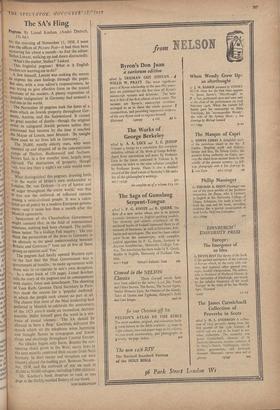The SA's Fling
J,
9N the morning of November 11, 1938, I went into the offices of Picture Post—it had then been a_ PPearing for about a month—to find the editor, Stefan Lorant, walking up and down distractedly.
'What's the matter, Stefan?' I asked. This frightful pogrom! What is it English readers are wanting me to do?'
A Jew himself, Lorant was seeking the means 1.9 express his own feelings through the paper.
But
also, Avith a true editor's responsiveness, he
was trying to give effective form to the roused
emotions of his readers. A phony expression of 1St 'Popular indignation' in Germany had aroused a
real one in the world.
The November 10 pogrom took the form of a Mass attack on Jewish property throughout Ger- many, Austria, and the Sudetenland. It caused 110 great number of deaths—though the original order to safeguard Jewish persons unless they intervened had become by the time it reached the Mayor ofLesum, near Bremen: 'By tonight there must be no Jews left in Germany.' The 30,000, mostly elderly men, who were rounded up and shipped off to the concentration camps of Dachau, Buchenwald and Sachsen- hausen had, in a few months' time, largely been released. The destruction of property, though ,vast, was less than a night's air raids would soon bring.
What distinguished this pogrom, drawing forth —in the words of Hitler's own ambassador in London, Dr. von Dirksen—`a cry of horror and of anger throughout the entire world,' was that it was not the outbreak of inflamed opinion among a semi-civilised people. It was a calcu- lated act of policy by a modern European govern- ment—and it came less than a month after the Munich agreement.
Spokesmen of the Chamberlain Government might contend that, in the field of international relations, nothing had been changed. The public knew better. To a Gallup Poll inquiry : 'Do you think the persecution of the Jews in Germany is an obstacle to the good understanding between Britain and Germany?' four out of. five of those giving an opinion said 'Yes.' The pogrom had finally opened Western eyes to the fact that the Nazi Government was a government of bandits : to make agreements with them was to co-operate in one's own deception.
In a short book of 150 pages, Lionel Kochan tells the story of the pogrom and its consequences with clarity, force and detachment. The shooting of Vom Rath, German Third Secretary in Paris, was made the excuse for a 'popular outbreak' in which the people took almost no part at all. The chance that most of the Nazi leadership had gathered in Munich to-celebrate the anniversary of the 19'6 putsch made an immediate decision Possible. Hitler himself gave the word in a sen- tence of casual vileness: 'The SA should be allowed to have a fling.' Goebbels delivered the speech which set the telephone wires humming and brought flames to synagogues and Jewish shops and dwellings throughout Central Europe.
No villainy begets only harm. Besides the eye- opening shock given to the West, many Jews in the next months contrived their escape from Nazi territory. In their rescue and reception our own country played the leading part. Between Novem- ber, 1938, and the outbreak of war we took in 40,000 to 50,000 refugees, including 9,000 children.
Mr. Kochan's book deserves to rank as one page in the darkly mottled history of our times.
TOM HOPKINSON










































































 Previous page
Previous page